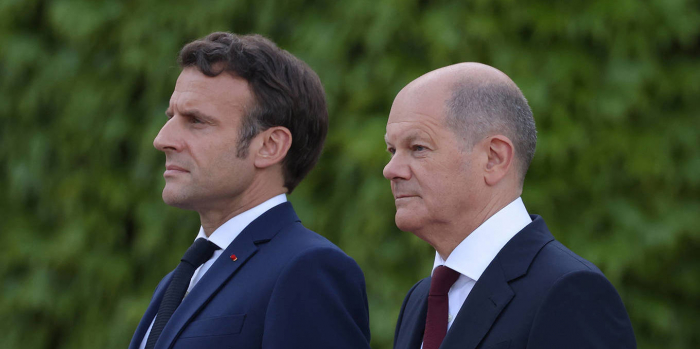In January 1963, German Chancellor Konrad Adenauer and French President Charles de Gaulle signed the bilateral Élysée Treaty, whereby the two former enemies officially ended two centuries of antipathy and bloodshed and committed to ushering in a new era of cooperation.
Signed five years after the Treaty of Rome entered into force, the Élysée Treaty was highly symbolic, and it laid the groundwork for Germany and France to become the European Union’s de facto leaders. EU partners know from experience that nothing can move forward if France and Germany are not on the same page, and that a Franco-German consensus generally paves the way to a wider agreement.
The relationship has had its ups and downs over the decades. Between 2010 and 2015, Germany and France’s inability to agree on how to respond to the euro crisis repeatedly brought the currency union to the brink. But there have also been remarkably harmonious moments. Within two months of COVID-19 hitting Europe, for example, the two countries devised an action plan that later formed the basis of the EU’s pandemic response.
Now, leadership is needed more than ever. Faced with numerous internal and external challenges, the EU must reevaluate its priorities, and perhaps its very purpose. The European project used to define itself in terms of economic and policy integration, but integration has stalled, and further progress – in areas such as banking and finance, energy, and digital services – faces significant roadblocks. The EU is also a product of the rules-based global order, but the postwar system that birthed it is crumbling at an accelerated pace. European leaders took continental peace for granted, but Russia’s invasion of Ukraine has provided a stark reminder of the limits of soft power.
At a time of escalating geopolitical tensions, Germany and France must help redefine the goals and priorities of the European project. But the two countries are at odds over several key challenges, including the natural-gas crisis and the future of Europe’s energy system; the appropriate response to the US Inflation Reduction Act (IRA); defense integration; and the bloc’s position vis-à-vis China. These tensions were evident in the remarkably bland joint statement issued by President Emmanuel Macron and German Chancellor Olaf Scholz to mark the 60th anniversary of the Élysée Treaty.
Several factors underlie the Franco-German divide. For starters, Scholz and Macron lack personal chemistry. They also find themselves in peculiar political situations domestically, as Scholz struggles to manage a three-party coalition, and Macron attempts to govern without a majority in the National Assembly.
But there are deeper reasons. Notably, shifting global power dynamics have led to the re-emergence of longstanding differences between French and German economic philosophies. While France regards the unraveling of the postwar system as an opportunity to reassert its sovereignty, Germany views this tectonic shift as a potentially lethal threat to its economic model. In a desperate effort to preserve its status as an export power, Germany is seeking trade diversification, pushing for new EU trade deals with the United States, Asian countries, and the United Kingdom.
The good news is that the differences are not unbridgeable. France’s preference for producing strategically important goods in the EU and Germany’s goal of diversifying its trading relationships complement each other. Still, to bridge the divide, the two countries must agree on a shared strategic framework, and they are still far apart in that regard.
Energy is a case in point. While France views the net-zero transition as an opportunity to restore energy independence and plans to rely massively on nuclear energy, Germany used to regard the transition as an opportunity to trade hydrogen and renewable electricity, with natural gas serving as a bridge between the present and future systems – until the war in Ukraine nipped these plans in the bud. Germany is now torn between dreams of a greener future and the grim reality of dependence on gas imports.
The choices countries make during crises shape their future, sometimes irreversibly. The IRA, the Biden administration’s signature climate change legislation, could be a watershed. The EU’s climate strategy was designed to be fiscally neutral and compatible with global competition principles. With the IRA, the US has chosen the opposite strategy. Far from being fiscally neutral, the IRA relies massively on subsidies and is deliberately distortive, given that the subsidies are conditional on companies’ commitment to create US-based jobs and to pay prevailing wages.
European leaders have still not decided whether they should try to emulate the IRA, which they claim discriminates against EU-based companies, and embark on a subsidy race, or build on its DNA and fight back with their own trade and competition instruments. Recent declarations suggest that they are leaning toward the first option.
When it comes to defense, the war in Ukraine has underscored the urgent need for both countries to revise their security strategies. Whereas Germany’s military is dysfunctional, the French army was built for small-scale interventions. But instead of working together, the countries are again at odds. France was upset by Germany’s decision to rely on US weaponry rather than invest in building Europe’s defense capabilities. And Germany, for its part, doubts that France – the only EU member state with nuclear weapons – will eventually expand the French nuclear umbrella beyond national borders.
A hasty compromise will not suffice to bridge substantial differences. France and Germany must begin the difficult process of sorting out the issues that stand in the way of deeper integration and establish realistic goals and expectations. Redefining a 60-year-old partnership is never easy, which is why they must do so now. The fate of Europe may depend on it.
Jean Pisani-Ferry, a senior fellow at the Brussels-based think tank Bruegel and a senior non-resident fellow at the Peterson Institute for International Economics, holds the Tommaso Padoa-Schioppa chair at the European University Institute.
More about:
















































